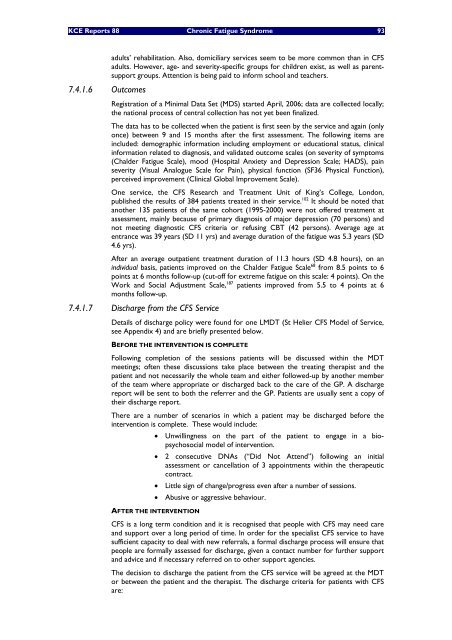Chronisch Vermoeidheidssyndroom: diagnose, behandeling en ...
Chronisch Vermoeidheidssyndroom: diagnose, behandeling en ...
Chronisch Vermoeidheidssyndroom: diagnose, behandeling en ...
Create successful ePaper yourself
Turn your PDF publications into a flip-book with our unique Google optimized e-Paper software.
KCE Reports 88 Chronic Fatigue Syndrome 93<br />
adults’ rehabilitation. Also, domiciliary services seem to be more common than in CFS<br />
adults. However, age- and severity-specific groups for childr<strong>en</strong> exist, as well as par<strong>en</strong>tsupport<br />
groups. Att<strong>en</strong>tion is being paid to inform school and teachers.<br />
7.4.1.6 Outcomes<br />
Registration of a Minimal Data Set (MDS) started April, 2006; data are collected locally;<br />
the national process of c<strong>en</strong>tral collection has not yet be<strong>en</strong> finalized.<br />
The data has to be collected wh<strong>en</strong> the pati<strong>en</strong>t is first se<strong>en</strong> by the service and again (only<br />
once) betwe<strong>en</strong> 9 and 15 months after the first assessm<strong>en</strong>t. The following items are<br />
included: demographic information including employm<strong>en</strong>t or educational status, clinical<br />
information related to diagnosis, and validated outcome scales (on severity of symptoms<br />
(Chalder Fatigue Scale), mood (Hospital Anxiety and Depression Scale; HADS), pain<br />
severity (Visual Analogue Scale for Pain), physical function (SF36 Physical Function),<br />
perceived improvem<strong>en</strong>t (Clinical Global Improvem<strong>en</strong>t Scale).<br />
One service, the CFS Research and Treatm<strong>en</strong>t Unit of King’s College, London,<br />
published the results of 384 pati<strong>en</strong>ts treated in their service. 102 It should be noted that<br />
another 135 pati<strong>en</strong>ts of the same cohort (1995-2000) were not offered treatm<strong>en</strong>t at<br />
assessm<strong>en</strong>t, mainly because of primary diagnosis of major depression (70 persons) and<br />
not meeting diagnostic CFS criteria or refusing CBT (42 persons). Average age at<br />
<strong>en</strong>trance was 39 years (SD 11 yrs) and average duration of the fatigue was 5.3 years (SD<br />
4.6 yrs).<br />
After an average outpati<strong>en</strong>t treatm<strong>en</strong>t duration of 11.3 hours (SD 4.8 hours), on an<br />
individual basis, pati<strong>en</strong>ts improved on the Chalder Fatigue Scale 68 from 8.5 points to 6<br />
points at 6 months follow-up (cut-off for extreme fatigue on this scale: 4 points). On the<br />
Work and Social Adjustm<strong>en</strong>t Scale, 187 pati<strong>en</strong>ts improved from 5.5 to 4 points at 6<br />
months follow-up.<br />
7.4.1.7 Discharge from the CFS Service<br />
Details of discharge policy were found for one LMDT (St Helier CFS Model of Service,<br />
see App<strong>en</strong>dix 4) and are briefly pres<strong>en</strong>ted below.<br />
BEFORE THE INTERVENTION IS COMPLETE<br />
Following completion of the sessions pati<strong>en</strong>ts will be discussed within the MDT<br />
meetings; oft<strong>en</strong> these discussions take place betwe<strong>en</strong> the treating therapist and the<br />
pati<strong>en</strong>t and not necessarily the whole team and either followed-up by another member<br />
of the team where appropriate or discharged back to the care of the GP. A discharge<br />
report will be s<strong>en</strong>t to both the referrer and the GP. Pati<strong>en</strong>ts are usually s<strong>en</strong>t a copy of<br />
their discharge report.<br />
There are a number of sc<strong>en</strong>arios in which a pati<strong>en</strong>t may be discharged before the<br />
interv<strong>en</strong>tion is complete. These would include:<br />
• Unwillingness on the part of the pati<strong>en</strong>t to <strong>en</strong>gage in a biopsychosocial<br />
model of interv<strong>en</strong>tion.<br />
• 2 consecutive DNAs (“Did Not Att<strong>en</strong>d”) following an initial<br />
assessm<strong>en</strong>t or cancellation of 3 appointm<strong>en</strong>ts within the therapeutic<br />
contract.<br />
• Little sign of change/progress ev<strong>en</strong> after a number of sessions.<br />
• Abusive or aggressive behaviour.<br />
AFTER THE INTERVENTION<br />
CFS is a long term condition and it is recognised that people with CFS may need care<br />
and support over a long period of time. In order for the specialist CFS service to have<br />
suffici<strong>en</strong>t capacity to deal with new referrals, a formal discharge process will <strong>en</strong>sure that<br />
people are formally assessed for discharge, giv<strong>en</strong> a contact number for further support<br />
and advice and if necessary referred on to other support ag<strong>en</strong>cies.<br />
The decision to discharge the pati<strong>en</strong>t from the CFS service will be agreed at the MDT<br />
or betwe<strong>en</strong> the pati<strong>en</strong>t and the therapist. The discharge criteria for pati<strong>en</strong>ts with CFS<br />
are:

















